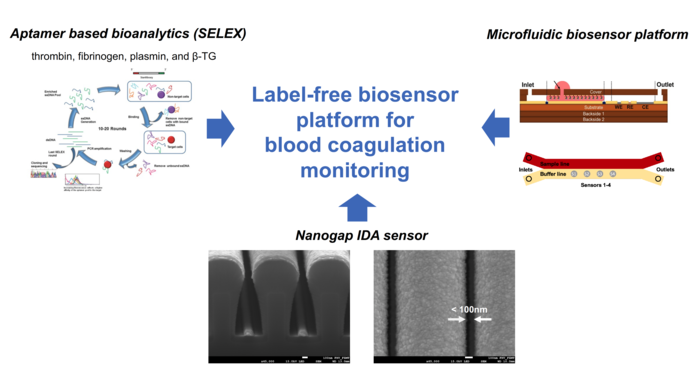Microfluidic impedance biosensor system for multiplexed and label-free on-site blood coagulation testing (MiCoaT)
The goal of this project is to implement a microfluidic impedance biosensor with aptamers that enables label-free measurement of multiple blood coagulation markers. For this purpose, new aptamers for thrombin, fibrinogen and plasmin will be selected and evaluated for their selectivity and sensitivity. In order to achieve high sensitivity and to overcome the problems with the ionic strength of the sample, different nanogap sensors with multiplex microfluidics will be fabricated and tested. Here, the influence of nanogap design (spacing, shape, passivation layer) and different materials for electrodes and microfluidics will be analyzed. Finally, the developed sensor will be applied to multiplexed on-site blood coagulation assays in relevant samples (whole blood and plasma) from healthy donors and evaluated using standard techniques.
.
In clinical coagulation diagnostics, there is already a great and urgent need for portable devices to determine coagulation status, especially during or even after extracorporeal treatments (e.g., cardiac surgery or dialysis). Inadequate monitoring or an inaccurate result can lead to bleeding complications or life-threatening thrombosis. Conventional coagulation analyses are either associated with long analysis times or require sample preparation, expensive equipment and qualified personnel. In addition, clinical findings based on a single biomarker are often insufficient to make a correct diagnosis. Therefore, it is highly desirable to measure multiple biomarkers simultaneously.
Impedimetric biosensors allow label-free (and even real-time) detection of biomolecular interactions. These are measured on the electrochemical system using a sinusoidal voltage at a specific frequency (or over a range of frequencies). Their relatively simple design and high degree of miniaturization favor this measurement method for the development of portable sensor systems. However, current impedimetric sensors suffer mainly from the influence of the ionic strength of the sample. Aptamers, short single-stranded oligonucleotides, can recognize their target molecules (e.g. proteins) with high specificity and affinity thanks to their 3D structure. In contrast to antibodies, they have numerous advantages: high stability, chemical synthesizability, sensitivity, selectivity. Therefore, in this project, aptamers for quantification of coagulation status are developed and evaluated to realize a triplex aptamer panel for on-site diagnostics.
.
A successful demonstration of the functionality of such a microfluidic impedance biosensor with aptamers would represent a paradigm shift in blood coagulation diagnostics. However, this system could also be used in other fields of application and even allow long-term measurement as well as online monitoring of biomarkers in the future.

Facts
| project name | Microfluidic impedimetric biosensor for blood congulation |
| Program | FWF, international Projects |
| Project number | I 4971-N |
| Project duration | 01.02.2021 - 31.01.2024 |
| Project budget total | 681.563,00 EUR |
| Share FHV: | 213.790,00 EUR |





